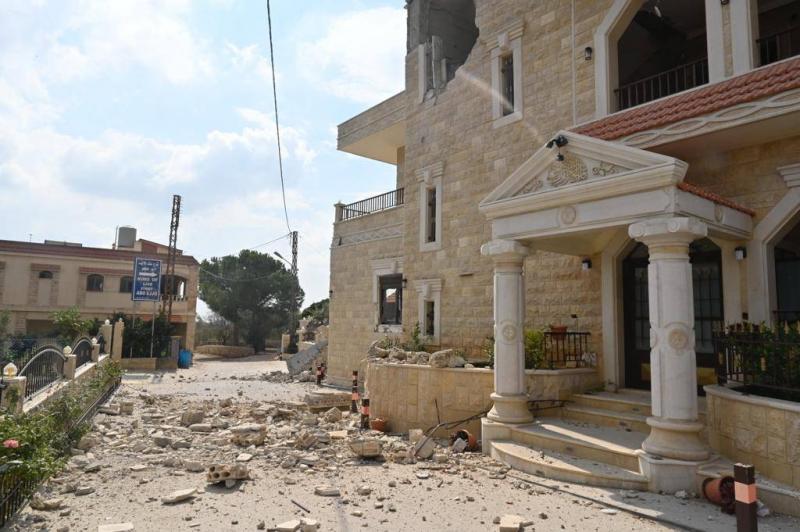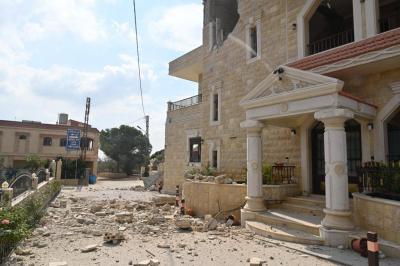Calm currently prevails in areas previously subjected to Israeli artillery shelling, amidst the surveillance flights of reconnaissance aircraft and the outbreak of fires surrounding the towns of Dhahirah and Marwheen. The National News Agency reported that the morning Israeli assaults on border villages and towns in the western sector caused significant damage to property and agricultural fields, injuring three people in the town of Marwheen, alongside damaging around ten homes directly. The primary water tank supplying the town of Yarin was also targeted, with fires continuing to escalate in the outskirts of the towns of Dhahirah and Marwheen, awaiting the Civil Defense to extinguish them.
In this context, the South Lebanon Water Corporation announced in a statement that "in a blatant violation of all international laws, especially those related to wars and the neutrality of infrastructure linked to basic needs, particularly water, Israeli forces targeted the water tank in Yarin on the Lebanese border with Palestine this morning, causing a side breach and the leakage of water designated for residential use by local citizens." The agency decried this action and urged all international organizations, particularly the international peacekeeping forces operating in the area, "to impose protection on vital facilities and condemn acts that affect the continuity of water supply." It confirmed that it would work through relevant official bodies "to file a complaint with the concerned international authorities, and coordinate with international peacekeepers and the International Red Cross to ensure the arrival of teams and equipment to carry out the necessary maintenance of the tank and restore water to the town and its residents."
Israeli forces had shelled the outskirts of the towns of Dhahirah, Marwheen, Yarin, and further to the periphery of the town of Tairharfa, following the launch of rockets from Lebanon toward its territory. The military stated that one of its positions in the north was fired upon by an anti-tank missile from Lebanon, with drones participating in the shelling of the western sector. Sirens were activated at "UNIFIL" sites in the towns targeted by the shelling. Likewise, the Israeli army issued sirens in the north "to warn of potential aerial threats from Lebanon or Syria." Security sources denied to "Wardna" that the Lebanese army had been asked to evacuate its border positions.
UNIFIL's spokesperson, Andrea Tenenti, stated in a report, in response to some rumors circulated by media and social media, that "during conflicts, rumors spread," confirming that "UNIFIL continues its presence and operational missions. Our core work continues, and UNIFIL leadership is in constant contact with authorities on both sides of the blue line, urging restraint."
The Israeli army began bombardments on Wednesday but did not provide any information about its casualties. The spokesperson for the Israeli army, Avichay Adraee, reported that "an anti-tank missile was launched from Lebanese territory towards a military site near the village of Arab al-Aramsha on the Lebanese border." The Israeli site "Walla" noted several injuries among soldiers at the targeted site, without specifying the number.
Hezbollah announced responsibility for targeting the Israeli site, stating it used guided missiles, resulting in multiple Israeli casualties. The party asserted in a statement that "it will be decisive in responding to Israeli assaults targeting our country and the safety of our people, especially when these assaults lead to the fall of martyrs."
Following this clash and the exchange of shelling between Lebanon and Israel, Israeli media reported, quoting a senior security official, that the recent developments in the north "will change the rules of the game."
The Lebanese army announced that after a reconnaissance and search operation in border areas, an army unit in the Qalayla plain found the platform from which several missiles were launched yesterday and carried a missile that the specialized unit worked on dismantling.
In this context, the Dutch government warned on Wednesday against travel to southern Lebanon due to the armed conflict with Israel, stating that no one should travel to the area extending south from the Litani River to the Israeli border.




